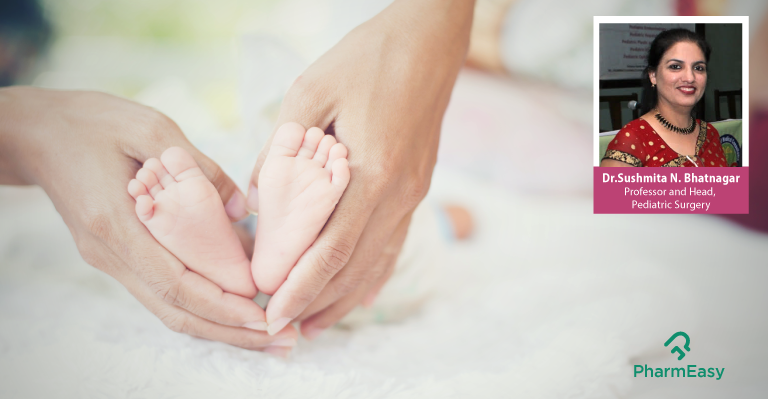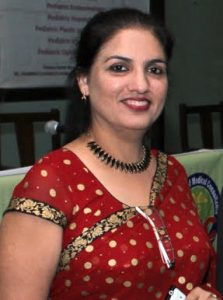Newborn Care: Apt Dosages, Treatments & More
By Dr. Nikita Toshi +2 more

Get,

to manage your symptom
Get your,


4 Cr+ families
benefitted

OTP sent to 9988776655



You’ve successfully subscribed to receive
doctor-approved tips on
Whatsapp

Get ready to feel your best.

Hi There,
Download the PharmEasy App now!!


Register to Avail the Offer
Send OTPBy continuing, you agree with our Privacy Policy and Terms and Conditions

Hi There,
Sign up on PharmEasy now!!
Trusted by 4 crore+ families

OTP sent to 9988776655



You have unlocked 25% off on medicines




Code: NU25
By Dr. Nikita Toshi +2 more
Children are unable to communicate or are not effective and accurate in communicating their condition, which makes it the responsibility of those who are taking care of the children to achieve an appropriate diagnosis and thus begin appropriate treatment of diseases. Every newborn and child needs customization of care, handling and treatment with appropriate dosages based on age and weight and that judgment and understanding on the part of the clinician make this the speciality of Pediatric Medicine and Pediatric Surgery very exciting as well as demanding.
A child is not a miniature adult. The health status of children is constantly changing as they are in a growing phase and their related issues are completely different from those in adults. Routine care of children of all age groups in itself is a tedious task as each and every age group has its own need and requirements in terms of understanding and caring for the child.

When we talk of diseases and a sick newborn or child, each age group has a different set of diseases that occur. Also, the behavior of the newborn or a child affected by the same disease is different as each child’s health and nutrition status is different. Speaking of newborn babies, healthy full-term babies delivered of normal delivery are also not of the same weight and not of similar health conditions both internally as well as externally (environmental factors), these differences completely change the management of these babies including the dosages of the medicines and responses to treatment.
Table of Contents
Pediatric Medicine and Pediatric Surgery are the two main branches of the medical profession that deal with diseases of children from birth (in fact even from the antenatal period (if any birth defect is detected) till 18 years of age.
With the advancement of medical science and technology, there is sub-specialisation in both the main branches and categorisation of doctors dealing with children in two ways-
Based on the age of the child such as neonatologists (looking after only newborn babies) or General Pediatricians (looking after children after the newborn period) or Adolescent pediatricians (looking after the needs of teenage children) and for surgical diseases of children General Pediatric Surgeons look after the common as well as advanced surgical conditions.
Based on the disease system/organ in Pediatric medicine such as Pediatric nephrologist (for kidney), Pediatric cardiologist (for the heart), Pediatric hepatologist (for liver), Pediatric neurologist (for the brain), Pediatric endocrinologist for endocrine glands), Pediatric pulmonologist (for lungs), Pediatric gastroenterologist (for intestines), hematologist (for blood diseases) oncologist (for cancer in children), etc.
The subspecialties in Pediatric Surgery based on system/organ similarly are Pediatric Anaesthesia, Pediatric Neonatal surgery (for newborn babies), Pediatric Hepatobiliary Surgeon (for liver surgeries), Pediatric Gastrointestinal surgeon (for intestinal surgical) diseases, Pediatric Urologist (for kidney surgeries), Pediatric Onco-surgeon (for childhood cancers), Pediatric orthopaedics (for bone and related disease), Pediatric ENT surgeon, Pediatric Ophthalmologist (for eyes), Pediatric plastic surgery and Burns, Pediatric Neurosurgery (for brain surgeries), Pediatric cardiothoracic surgery (for heart surgery), Pediatric endocrine surgery (for endocrine organ diseases), Pediatric Reconstructive Surgery, Pediatric Maxillofacial surgery, etc.
The allied branches also specialised for children are Pediatric Radiology, Pediatric Physiotherapy, Pediatric Occupational therapy, Pediatric Dietetics, Pediatric Nursing which is highly specialised as well as an integral part of the care of the child.
All children need vitamin D drops beginning shortly after birth. Children younger than 12 months old need 400 IU of vitamin D each day. Children 12 to 24 months old need 600 IU of vitamin D each day.
Dr. Ashish Bajaj, MBBS, MD in Clinical Pharmacology and Toxicology
First and foremost adequate and appropriate methods of caring and handling newborns and children have to be laid down. Deficiency in knowledge, understanding and caring on the part of all those who handle children right from parents and relatives to the medical and nursing team is a big challenge that India is facing even in the metro cities. Ignorance leads to a delay in diagnosis and treatment which is detrimental to the health of the child as children deteriorate very rapidly as compared to adults and succumb to their illnesses if prompt action is not taken.
Skilled medical and nursing professionals availability is also lacking in our country. Where an estimated 50-60% of healthcare is offered by private clinicians and nursing home sectors in our country, skill development in specific areas of neonatal and pediatric care are lacking and thus even those primarily trained in adult diseases are treating and managing many conditions in children including performing operations. This certainly affects the outcome of both the medical and surgical conditions some of which become irreparable or uncorrectable, thus eventually leading to unhealthy adult society.
Babies usually get the bacteria from their mothers during birth and present with symptoms usually within the first 4 weeks of their birth.
Dr. Ashish Bajaj, MBBS, MD in Clinical Pharmacology and Toxicology
Apart from technological innovations, the basic concept of ”Humanised Pediatric Care” has evolved which gives priority to the emotional care of the suffering child, to reduce the adverse psychological impact of disease, procedures, treatment and surgeries in children. The broad areas under which innovations in pediatric healthcare can be categorized are :

Prof (Dr) Sushmita N Bhatnagar is Head, Department of Pediatric Surgery, BJ Wadia Hospital for Children, Parel, Mumbai
Disclaimer: The information provided here is for educational/awareness purposes only and is not intended to be a substitute for medical treatment by a healthcare professional and should not be relied upon to diagnose or treat any medical condition. The reader should consult a registered medical practitioner to determine the appropriateness of the information and before consuming any medication. PharmEasy does not provide any guarantee or warranty (express or implied) regarding the accuracy, adequacy, completeness, legality, reliability or usefulness of the information; and disclaims any liability arising thereof.
Links and product recommendations in the information provided here are advertisements of third-party products available on the website. PharmEasy does not make any representation on the accuracy or suitability of such products/services. Advertisements do not influence the editorial decisions or content. The information in this blog is subject to change without notice. The authors and administrators reserve the right to modify, add, or remove content without notification. It is your responsibility to review this disclaimer regularly for any changes.

Leave your comment...
Comments